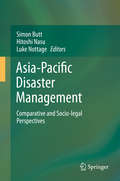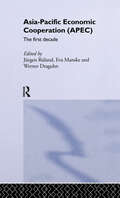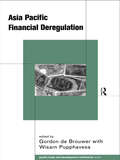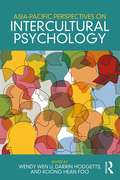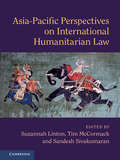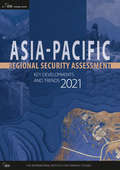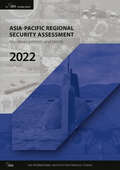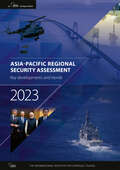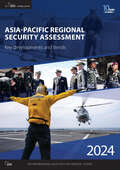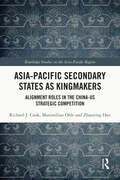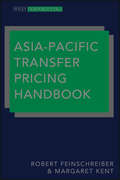- Table View
- List View
Asia-Europe Industrial Connectivity in Times of Crisis
by Robert Taylor Sam Dzever Lucía MoralesAsia-Europe Industrial Connectivity in Times of Crisis
Asia-Pacific Disaster Management: Comparative and Socio-legal Perspectives
by Luke Nottage Hitoshi Nasu Simon ButtThe book outlines the regulatory environment for disaster prevention and management in broad social, economic and political context. The first half of the book focuses mainly on Japan, especially the '3-11' events: the earthquake and tsunami that devastated the Tohoku area on 11 March 2011 and the Fukushima Daiichi nuclear power plant radiation leaks. The second half focuses on the USA (the only other Asia-Pacific country to have experienced a serious nuclear emergency), Indonesia, China, New Zealand, Australia and international law. One question explored is whether socio-legal norms play different roles in preventing and managing responses to natural disasters compared to 'man-made' disasters. Another is how 'disaster law' interacts with society across very diverse societies in the disaster-prone Asia-Pacific region. The book also addresses the increasingly important roles played by international law and regional regimes for cross-border cooperation in disaster prevention and relief, including the functions played by military forces. Erudite, pragmatic, and charged with detailed, substantive knowledge of an astonishing range of contexts and research fields, this timely collection of important essays on the law and society of disaster management stands as an exemplary international academic response to the disasters of 11 March 2011. (Annelise Riles)
Asia-Pacific Economic Cooperation (APEC): The First Decade
by Jürgen Rüland Eva Manske Werner DraguhnThe Asia-Pacific Economic Cooperation (APEC) was founded in 1989. Since then the forum has developed into a major player in tri-partite relations between North America, East Asia and Europe. The Seattle and Bogor Summits were landmark events suggesting to many observers a gravitational shift in the world economy and world politics. Yet the Asian financial crisis had a sobering effect on high-flying expectations as APEC contributed little to crisis management. In the light of such contradictory performance, distinguished scholars here examine APEC's achievements and failures, its role and functions in international relations, its linkages with regional organisations and the interplay between the forum and national interests of major factors in the region.
Asia-Pacific Film Co-productions: Theory, Industry and Aesthetics (Routledge Studies in Media and Cultural Industries)
by Dal Yong Jin Wendy SuThis book examines cross-regional film collaboration within the Asia-Pacific region. Through a mixed methods approach of political economy and industry, market and textual analysis, the book contributes to the understanding of the global fusion of cultural products and the reconfiguration of geographic, political, economic, and cultural relations. Issues covered include: cultural globalization and Asian regionalization; identity, regionalism, and industry practices and inter-Asian and trans-Pacific co-production practices among the U.S., China, South Korea, Japan, India, Hong Kong, Argentina, Australia, Taiwan, and New Zealand.
Asia-Pacific Film Co-productions: Theory, Industry and Aesthetics (Routledge Studies in Media and Cultural Industries)
by Dal Yong Jin Wendy SuThis book examines cross-regional film collaboration within the Asia-Pacific region. Through a mixed methods approach of political economy, industry and market, as well as textual analysis, the book contributes to the understanding of the global fusion of cultural products and the reconfiguration of geographic, political, economic, and cultural relations. Issues covered include cultural globalization and Asian regionalization; identity, regionalism, and industry practices; and inter-Asian and transpacific co-production practices among the U.S.A., China, South Korea, Japan, India, Hong Kong, Taiwan, Argentina, Australia, and New Zealand.
Asia-Pacific Financial Deregulation (PAFTAD (Pacific Trade and Development Conference Series) #5)
by Gordon De Brouwer Wisarn PupphavesaRecent events in East Asia have highlighted the risks of volatility and contagion in a financially integrated world. Countries in the region had been at the forefront of the movement towards increased integration but the crisis that struck Thailand in July 1997, and the rapidity with which it spread to other East Asian nations, suggested that all was not well. Weaknesses in domestic financial intermediation, poor corporate governance and deficient government responses to large capital inflows all played a role in the build-up of vulnerability. Asia-Pacific Financial Deregulation provides an insight into financial liberalisation and structural reform in the region generally and as illustrated by a number of countries.
Asia-Pacific Fishing Livelihoods
by Kate Barclay Michael FabinyiThis open access book explores fishing livelihoods in the context of the wider contexts in which they are embedded. Drawing on case studies from across the Asia-Pacific region, the book highlights how fishing livelihoods are shaped by globalisation, social relationships and governance. The book concludes by showing how better understanding these relationships can contribute to governance for healthier ecosystems and social wellbeing.This is an open access book.This is an open access book.
Asia-Pacific Judiciaries: Independence, Impartiality and Integrity
by Lee Hoong Phun Marilyn PittardJudicial independence, integrity and impartiality are crucial to public trust in the judiciary. Justice must also be seen to be dispensed fairly and without fear or favour. In the context of themes and perspectives as well as comparative theories of independence, this book provides a contemporary analysis of the role and independence of judges in 15 countries in the Asia-Pacific. Expert analyses include countries that are governed by authoritarian governments or are beset by dramatic government changes, which undermine judges by attacking and preventing their independence, to more democratic countries where there are strides towards judicial independence. The problems confronting judges and courts are explained and analysed, with the aim of establishing a commonality of standards which can be developed to strengthen and promote the important values of judicial independence, impartiality and integrity. Solutions for the Asia-Pacific region are also proposed.
Asia-Pacific Nations in International Peace Support and Stability Operations
by Chiyuki Aoi Yee-Kuang HengThe eastward shift of political and economic power has been accompanied by increasing interest and participation in international peace support and stability missions by Asia-Pacific countries. From rising giants such as China and Indonesia to newer contributors such as Cambodia and the tiny city-state of Singapore, this book provides a first-ever cross-regional comparison of the capabilities of Asia-Pacific countries to contribute to peace support missions, with an eye to identifying strengths, weaknesses, emerging trends and policy implications.
Asia-Pacific Perspectives on Intercultural Psychology
by Darrin Hodgetts Wendy Wen Li Koong Hean FooToday�s world is more interconnected and interdependent than ever before. Within the context of globalisation and the associated increased contact between diverse groups of people, the psychology of culture is more relevant than ever. Asia-Pacific Perspectives on Intercultural Psychology brings together leading researchers from 11 countries to show
Asia-Pacific Perspectives on International Humanitarian Law
by Sandesh Sivakumaran Tim McCormack Suzannah LintonPlace is inextricably linked to history by way of culture, language, philosophy, faith and the development of worldviews. The richness and depth of experience of the Asia-Pacific region has been under-studied, over-simplified and under-appreciated. This book addresses that lacuna in the subject area of international humanitarian law. Drawing on authoritative perspectives and interviews with experts in and on this topic, including four of the region's most distinguished international judges, forty-one chapters thematically examine the development of international humanitarian law; practice and application of international humanitarian law; implementation and enforcement of international humanitarian law; and looking to the future and enhancing compliance with international humanitarian law. The expert contributors draw out unique features, providing fresh insights to scholarship. Contributions on and from the area also grapple with the regional commitments to humanitarianism generally, illuminating how and why international humanitarian law might be more readily accepted or ignored in armed conflicts in the region.
Asia-Pacific Regional Security Assessment 2017
by International Institute for Strategic StudiesThis book offers an analysis of the four central regional security themes relevant to the policy-focussed discussions at the annual IISS Shangri-La Dialogue. Namely: The evolving roles of the United States and China in Asia-Pacific security;Responses by the US and regional states to regional security tensions, particularly in the South China Sea;Emerging security questions relating to nuclear weapons, missiles and military cyber capabilities;The prospects for regional security cooperation, including the challenges for the ASEAN-centred architecture.
Asia-Pacific Regional Security Assessment 2020: Key Developments and Trends
by The International Institute for Strategic StudiesThe Asia-Pacific Regional Security Assessment provides insight into key regional strategic, geopolitical, economic, military and security topics. Among the topics explored are: the deteriorating US China relationship and great-power competition; US alliances and security partnerships; the collapse of the Intermediate-range Nuclear Forces Treaty; diplomatic gridlock on the Korean Peninsula; Japan’s role in Indo-Pacific security; the breakdown in Japan–South Korea relations; Indonesian policy towards the South China Sea; Australia’s defence and security outlook; the European security role in Asia. Authors include leading regional analysts and academics Douglas Barrie, William Choong, Aaron Connelly, Andrew Davies, Michael Elleman, Bonnie S. Glaser, Euan Graham, Christopher W. Hughes, Meia Nouwens, Brendan Taylor and William Tow.
Asia-Pacific Regional Security Assessment 2021: Key Developments and Trends
by The International Institute for Strategic StudiesThe Asia-Pacific Regional Security Assessment 2021 provides insight into key regional strategic, geopolitical, economic, military and security topics. Among the topics explored are: US−China decoupling and its regional security implications; Japan’s security policy and China; India’s emerging grand strategy; Southeast Asia amid rising great-power rivalry; Australia’s new regional security posture; NATO’s evolving approach to China; The United Kingdom’s ‘tilt’ to the Indo-Pacific; and Emerging technologies and future conflict in the Asia-Pacific. Authors include leading regional analysts and academics Kanti Bajpai, Gordon Flake, Franz-Stefan Gady, Prashanth Parameswaran, Alessio Patalano, Samir Puri, Sarah Raine, Tan See Seng, Drew Thompson, Ashley Townshend, Joanne Wallis and Robert Ward.
Asia-Pacific Regional Security Assessment 2022: Key Developments and Trends
by The International Institute for Strategic StudiesThe Asia-Pacific Regional Security Assessment examines key regional security issues relevant to the policy-focused discussions of the IISS Shangri-La Dialogue, Asia’s premier defence summit convened by the International Institute for Strategic Studies. It is published each year in association with the Dialogue and the issues analysed within its covers are central to discussions at the event. Among the topics explored are: US Indo-Pacific strategy, alliances and security partnerships; Chinese perspectives on regional security; Taiwan’s security and the possibility of conflict; the continuing challenges posed by North Korea’s nuclear and missile programmes; the nuclear dynamics of Sino-American security relations; air and naval operations in the Asia-Pacific; Sino-American technology competition; Japan’s competition and cooperation with China; India’s role in the Quadrilateral Security Dialogue (Quad); the evolving regional security engagement of European states and the European Union; China’s role as an upstream state in the Mekong sub-region; and the climate crisis and Asia-Pacific security. As this volume goes to press, the war in Ukraine overshadows the international security landscape and many chapters in this volume touch on the conflict’s ramifications for security in the Asia-Pacific. Authors include leading regional analysts and academics at the forefront of research and analysis: Aidan Foster-Carter, James Crabtree, Peter A. Dutton, Brian Eyler, Michael Green, Sheryn Lee, Jeffrey G. Lewis, Tanvi Madan, Jeffrey Mazo, Ben Schreer, Yun Sun, Nicholas Szechenyi, Brendan Taylor, Ashley Townshend and Paul Triolo.
Asia-Pacific Regional Security Assessment 2023: Key developments and trends
by The International Institute for Strategic StudiesThe Asia-Pacific Regional Security Assessment examines key regional security issues relevant to the policy-focused discussions of the IISS Shangri-La Dialogue, Asia’s premier defence summit convened by the International Institute for Strategic Studies. It is published and launched at the Dialogue and the issues analysed within its covers are central to discussions at the event. Since February 2022, the war in Ukraine has provided a bleak backdrop for discussions about international security. While the war has affected many aspects of security and defence in the Asia-Pacific, the region also has its own dynamics, and important security-related developments have occurred there since the invasion. Among these, China’s ever-growing power and increasingly assertive posture remain the leading long-term challenges for the region. This tenth edition of the Asia-Pacific Regional Security Assessment contains an introduction and six chapters, authored by IISS experts, which investigate important dimensions of the regional security environment, supported by maps, graphs, charts and tables. Topics include: the war in Ukraine and the Asia-Pacific balance of power; strained US- China relations and the growing threat to Taiwan; Asia-Pacific naval and maritime capabilities; China’s Belt and Road Initiative; Japanese security and defence policy; and the conflict in Myanmar and the international response. Authors include leading regional analysts and academics at the forefront of research and analysis: James Crabtree, Euan Graham, Nigel Inkster, Nick Childs, Meia Nouwens, Robert Ward, Yuka Koshino, Aaron Connelly and Shona Loong
Asia-Pacific Regional Security Assessment 2024: Key developments and trends
The Asia-Pacific Regional Security Assessment (APRSA) examines key regional security policies and challenges relevant to the proceedings of the IISS Shangri-La Dialogue, Asia’s premier defence summit convened by the International Institute for Strategic Studies (IISS). It is published and launched at the Dialogue and the issues analysed within its covers are central to discussions at the event and beyond. This eleventh edition comes as the APRSA celebrates its first decade. A dozen IISS experts reflect on a decade of change and continuity across major security policies and challenges facing the Asia-Pacific region. Three themes materialise across six chapters: the pressure and constraints surrounding great-power competition, the enduring value of alliances and partnerships and the impact of advanced and emerging technology for regional security dynamics.In addition to the introduction, the APRSA will now feature a special-topic chapter providing a deeper analysis of an enduring security policy and challenge. The other five chapters investigate further key dimensions of the regional security environment, supported by maps, graphs, charts and tables. The six chapters of this year’s APRSA cover the following topics: Combined military exercises in the Asia-Pacific Crisis management between the United States and China India’s defence partnership in the Asia-Pacific Diplomatic approaches to managing the Myanmar conflict Disinformation campaigns in the Asia-Pacific The Asia-Pacific air-to-air challenge
Asia-Pacific STEM Teaching Practices: From Theoretical Frameworks to Practices
by Ying-Shao Hsu Yi-Fen YehThis book offers various perspectives on the complex and crosscutting concepts of the science, technology, engineering, and mathematics (STEM) disciplines in the classroom context. Presenting empirical studies, it reveals how researchers in the Asia-Pacific Region planned and implemented STEM education in the classroom. Further, it discusses the assessment of STEM learning to clarify what important elements should be included and how researchers and educators frame and design assessment tools. The book consists of four parts: potential and trends in STEM education; teachers’ practical knowledge for STEM teaching; STEM teaching practices; and assessment of STEM learning. Providing evidence on developing curriculums, implementing instructional practices and educating classroom teachers, it is intended for readers wanting to explore STEM education from multiple perspectives.
Asia-Pacific Secondary States as Kingmakers: Alignment Roles in the China-US Strategic Competition (Routledge Studies on the Asia-Pacific Region)
by Richard J. Cook Zhaoying Han Maximilian OhleFocusing on the Asia-Pacific region, Cook, Ohle and Han investigate the escalating strategic competition between China and the US. They explore the dynamics of key regional secondary states caught in the middle, namely Japan, South Korea, the Philippines and Vietnam, emphasising their crucial role as potential kingmakers in the shifting balance of power.China and the US are competing to win influence over these regional linchpins to advance their geopolitical ambitions and ultimately win the strategic competition. Elucidating a “power of the weak paradox”, this contribution examines the challenging choices faced by these secondary states as they navigate alignment pressures, which influence the trajectory of the great power strategic competition. Drawing upon a range of first-hand government sources and regional perspectives, the authors take the temperature of the China-US strategic competition, revealing the intricate influencing dynamics and perilous choices linchpins are being pushed to make that will determine the fate of the Asia-Pacific.This is a timely resource for researchers, students, scholars and politicians navigating the complex realm of international relations by providing a profound exploration of power struggles, strategic choices and the often-overlooked role of secondary states.
Asia-Pacific Security Challenges: Managing Black Swans and Persistent Threats (Advanced Sciences and Technologies for Security Applications)
by Anthony J. Masys Leo S. F. LinThis edited book examines the contemporary regional security concerns in the Asia-Pacific recognizing the 'Butterfly effect', the concept that small causes can have large effects: 'the flap of a butterfly's wings can cause a typhoon halfway around the world'. For many Asia-Pacific states, domestic security challenges are at least as important as external security considerations. Recent events (both natural disasters and man-made disasters) have pointed to the inherent physical, economic, social and political vulnerabilities that exist in the region. Both black swan events and persistent threats to security characterize the challenges within the Asia-Pacific region. Transnational security challenges such as global climate change, environmental degradation, pandemics, energy security, supply chain security, resource scarcity, terrorism and organized crime are shaping the security landscape regionally and globally. The significance of emerging transnational security challenges in the Asia-Pacific Region impact globally and conversely, security developments in those other regions affect the Asia-Pacific region.
Asia-Pacific Security Cooperation: National Interests and Regional Order (Belfer Center Studies In International Security Ser.)
by See Seng TanNew developments in the Asia Pacific are forcing regional officials to rethink the way they manage security issues. The contributors to this work explore why some forms of security cooperation and institutionalisation in the region have proven more feasible than others.
Asia-Pacific Security Dynamics in the Obama Era: A New World Emerging (Politics in Asia)
by S Mahmud AliThis book examines the critical changes to the Asia-Pacific security architecture emerging in the context of shifts in the global order as the Obama Administration’s major strategic innovation and likely legacy unfold. The author reviews the state of the international security system during the Obama presidency, recording the Administration’s Asia-Pacific inheritance, and tracing its efforts to chart a collaborative course aimed at retaining US primacy amidst strategic turbulence. While security discourses are coloured by relative US ‘decline’ and China’s ‘rise,’ the book points out the competitive-cooperative complexity of interactions, with symbiotic economic ties moderating rivalry. Focusing on the military-security cutting edge of Sino-US dynamics, the narrative outlines the dangers posed by extreme nationalist dialectics in an interdependent milieu. It examines the policies of Japan, Australia, India and Russia towards the evolving Sino-US diarchy, while recording Washington’s and Beijing’s contrasting approaches to these allies and possible adversaries. The book concludes with observations on the loss of definition and clarity as the system evolves with multiple actors bidding for influence, and the need for statesmanship as the systemic fulcrum moves from the Atlantic to the Pacific. This book will be of interest to students and scholars of International Politics, Asian Politics, American Politics, International Security and International Relations.
Asia-Pacific Security Dynamics: US-China-Japan Triadic Trajectories (Global Power Shift)
by S. Mahmud AliThis book examines the causes and consequences of the dramatic shift in Japanese national security perspectives and mutually exclusive policies toward China and the USA. It sheds new light on the changing trajectories of triadic dynamics shaping U.S.-China-Japan strategic insecurity, their historical roots, its implications for trans-Pacific peace and stability, and their potential influence on emerging regional and systemic security architectures. Against the backdrop of U.S.-proclaimed "great power competition" with China as the defining feature and organizing principle of the U.S.-led coalition's strategic and geopolitical responses to China's "national rejuvenation," with primacy's "displacement anxiety" triggering a "systemic transitional fluidity," the book examines the origins and outcomes of Sino-Japanese insecurity, its polarizing effects on U.S.-China and U.S.-Japan relations, and the wider systemic resonances and dissonances as the post-Cold War unipolar systemic structure gives way to an uncertain, ambiguous, and imprecise successor regime. Finally, historical lessons drawn from primary documents are used to illuminate the prospects for triangular relations in shaping the Asia-Pacific security ecology over the medium term.
Asia-Pacific Security: US, Australia and Japan and the New Security Triangle (Asian Security Studies)
by William T. Tow Mark J. Thomson Yoshinobu Yamamoto Satu P. LimayeThe aim of this book is to explore the implications stemming from the recent upgrading of Australia-Japan-US security interactions and the implications for Asia-Pacific regional security that these represent. While a fully functioning trilateral security alliance binding Australia, Japan and the United States is unlikely to materialise or 
Asia-Pacific Transfer Pricing Handbook
by Margaret Kent Robert FeinschreiberAn overarching look at transfer pricing regimes in Asia-Pacific countries and what they mean for foreign businessesA comprehensive guide for companies doing business globally, Asia-Pacific Transfer Pricing Handbook explains the policies and practices that Asia-Pacific countries employ with regards to taxing foreign businesses. The only book that analyzes and guides companies through the often complex transfer pricing rules in place in Asian-Pacific nations, the book explains how authorities in fifteen countries, including ASEAN, India, New Zealand, Japan, and South Korea, tax any company doing business within their borders.Helping foreign companies to properly price their goods and services for global markets, providing defenses for transfer pricing audits, explaining standards for creating comparables that multijurisdictional tax administrations will accept, explaining documentation requirements and timing issues, and creating awareness about inadvertently becoming a permanent establishment, Asia-Pacific Transfer Pricing Handbook is an essential resource for doing business abroad.Provides comprehensive, accessible information on transfer pricing in Asia-Pacific countriesCovers fifteen Asia-Pacific countries, including all ASEAN countries, giving readers unparalleled exposure to the different transfer pricing arrangements across the regionExplains how companies doing business abroad should price their goods and services for global markets to remain in accordance with the lawA complete and comprehensive guide to transfer pricing and its implications for firms and accountants operating in the Asia-Pacific region, Asia-Pacific Transfer Pricing Handbook explains everything foreign companies need to know about doing business abroad.

